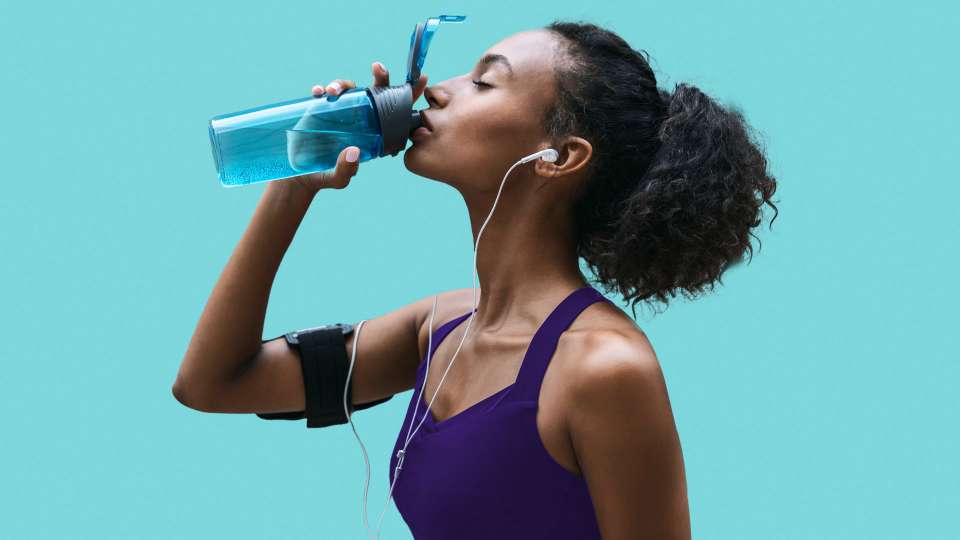All Your Questions Answered About Hydrating on Race Day

Staying hydrated during a marathon is important for your race performance and your health — dehydration and over-hydration can have a detrimental effect on both. Just as a good training plan is necessary to get you successfully across the finish line, so is a personal hydration plan. Below, I’ve answered some common questions on how to make one.
How much liquid do I need?
There are three steps to use to calculate how much to drink on race day:
Calculate your sweat rate
Sweat rates are not uniform. They vary according to genetics, conditioning (what kind of shape you are in) and the ambient environment (how hot or cold it is). Your sweat rate can range from very small amounts of sweat loss to dumping up to three liters per hour when exercising in very hot conditions. To get an accurate picture, you need to calculate your own sweat rate in conditions that match the day of the race.
To do this, just before a one-hour training run (preferably at marathon pace), weigh yourself unclothed. When you return from your run, disrobe, dry yourself off, and weigh yourself again. The weight difference is the amount of fluid lost. (Rapid weight loss is an indicator of fluid loss, not fat loss.) If you lost one pound (16 ounces) during that one-hour run, you thus need to drink 4 ounces every 15 minutes to replace your losses.
Calculate your salt loss
Just as sweat rates are not uniform, the amount of salt in sweat is not either. Thus, salty sweaters need to consider increased salt replacement with sports drinks or even with pretzels or soup when nearing the end of the race. To estimate your salt loss through your sweat, compare yourself to your training partners. Those who have a higher salt concentration in sweat are the ones with more white stains on their clothing and skin after a hard run.
Make a hydration plan
Below are general ranges to follow for hydration. A smaller person generally needs smaller amounts; a larger person more. However, remember to individualize your hydration strategy using the steps above.
Every day:
- Drink 2 liters of fluid (68 ounces or eight to nine 8-ounce glasses), plus replace any losses related to daily exercise.
Before the race:
- Drink 10 to 20 ounces two to three hours before the race.
- Drink another 4 to 10 ounces about 10 minutes before.
During the race:
- Base this on your calculated sweat rate (above).
- An estimated amount is 400 to 800 milliliters per hour (15 to 30 ounces per hour).
After the race:
- Drink 16 to 24 ounces for every pound of body weight lost.
Should I use a sports drink or mix?
For exercise lasting less than one hour, water is adequate. When exercising more than that, it is important to have carbohydrates (sugars) and electrolytes in your fluid replacement solution, and thus a sports drink (with 6-8% carbohydrate) is appropriate.
Is it possible to over-hydrate?
Drinking too much fluid can dilute the sodium level in your blood and cause a potentially dangerous condition called hyponatremia (low blood sodium). Those at greater risk for developing hyponatremia include runners who drink too much before or during a race, slower-paced runners (thus a longer period when fluids can be consumed), and potentially runners who have high sodium concentration in their sweat. On race day, remember to only drink enough fluids to replace your sweat losses.
The bottom line
Dehydration has well known effects on performance and health — slower speeds and increased risk of heat illness to name a few. Overhydration can have similar detrimental effects. So, creating a race day hydration strategy is important.
Fluid replacement plans need to be individualized as general recommendations may not be optimal for individual runners of differing body types with varying degrees of training and heat acclimatization. Don't forget to create a race day hydration strategy and stick to it.
Mark Harrast, MD, is a sports medicine physician and medical director of the Sports Medicine Center at Husky Stadium and the UW Medicine Seattle Marathon. He specializes in diagnosing and treating sports-related injuries and illnesses in endurance athletes, runners and triathletes. He is also an accomplished competitive endurance athlete himself.

 Healthy ideas for your inbox
Healthy ideas for your inbox





